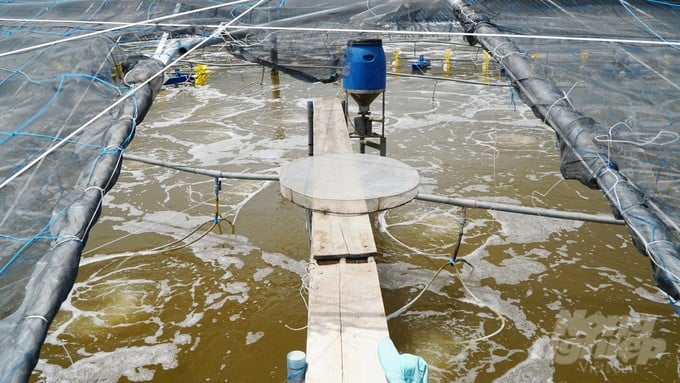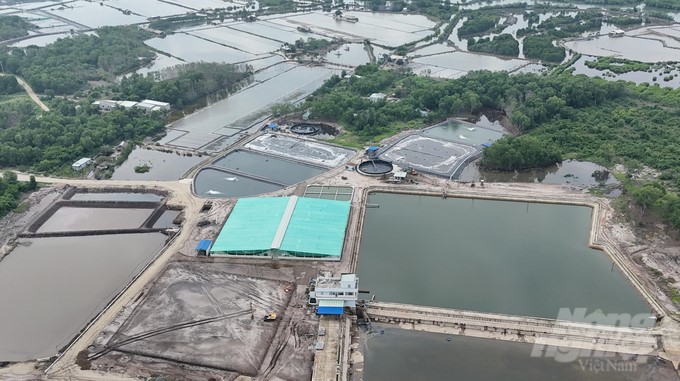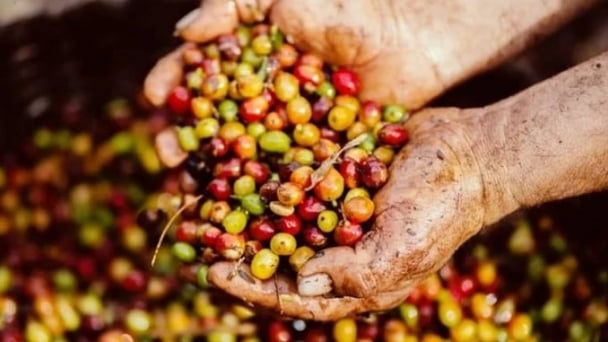June 17, 2025 | 21:02 GMT +7
June 17, 2025 | 21:02 GMT +7
Hotline: 0913.378.918
June 17, 2025 | 21:02 GMT +7
Hotline: 0913.378.918

Whiteleg shrimp farming models are investing in synchronous farming techniques in canvas-lined ponds or steel-frame floating ponds with canvas lining, roofing, and raising in membrane houses. Photo: Le Binh.
Previously, aquaculture in Ba Ria-Vung Tau province was quite small-scale and fragmented. Since the offshore fishing industry is gradually becoming more difficult, it is necessary to develop the aquaculture industry with the application of high technology.
Aquaculture not only has the ability to create economic breakthroughs, contributing to creating a stable supply of raw materials for seafood exports, but also helps reduce pressure in offshore fishing.
Many businesses and cooperatives are now investing heavily in technology to create a solid "shield" for aquaculture. These typical models use farming methods in canvas-lined ponds or steel-frame floating ponds with canvas lining, roofing, and raising in membrane houses, reaching an output of up to 30-50 tons/ha/crop.
Engineer Doan Van Nam, in charge of the Aquaculture Department, Provincial Sub-Department of Fisheries, said that for whiteleg shrimp alone, the farming area with the application of high technology is increasingly expanding. Currently, there are 23 organizations and individuals engaged in aquaculture and seed production using high technology, with a total area of about 429.31 hectares.
Among them, there are 21 whiteleg shrimp farming facilities applying high technology with an area of 417.31 hectares. The main form is farming in floating ponds and round lakes with roofs, raising in membrane houses and closed houses with a density of 250-500 heads/m2 and an output of 30-50 tons/ha/crop.
"The pond water environment is strictly controlled; the water source is circular and closed. The farming process is less affected by weather factors and has the ability to control diseases and the environment very well. Therefore, shrimp farming facilities have 3-4 crops/year," Mr. Nam shared.
Quyet Thang Agricultural Cooperative (Ba Ria city) is one of the pioneering and typical units in applying high technology to whiteleg shrimp farming. The Cooperative not only invests in a solid pergola system and floating canvas but also applies circulating water technology in farming.
Mr. Nguyen Kim Chuyen, Director of the Cooperative, said that the closed and circular farming process in the covered house helps to be environmentally friendly, limiting the use of chemicals and medicines that people have always used.
"The application of this science and technology increases productivity and output compared to before. Water is always controlled and used in circulation, which also helps shrimp stay healthy and grow well," Mr. Chuyen said.

Thanks to high-tech applications, farmers can control shrimp health well. Photo: Le Binh.
Thanks to the application of high technology, Quyet Thang Cooperative has been able to control the farming environment. Compared to the traditional farming method of only 1 crop/year with a yield of 5 tons/year/ha, up to now, this Cooperative's productivity has increased 20 times with 3 farming crops/year.
Ba Ria-Vung Tau Agricultural Extension Center also strengthens encouraging high-tech shrimp farming models throughout the province, converting farming methods to intensive and super-intensive farming, and promoting high-tech whiteleg shrimp output throughout the province.
"We also have measures to manage and maintain all farming activities of remaining objects, such as giant tiger prawn, freshwater fish, saltwater fish, and other aquatic animals, to ensure stable development," said Mr. Nguyen Van Cuong, Director of the Provincial Agricultural Extension Center.

Shrimp farms are methodically invested with circulating water systems, which are both economical and safe for shrimp and do not pollute the environment. Photo: Le Binh.
According to Mr. Cuong, the application of 4.0 technology in aquaculture also helps manage effectively, reduce risks, proactively adapt to climate change, and be more sustainable.
On the other hand, economic development from aquaculture also leads to the formation and development of new supporting industries, especially the fields of logistics, animal feed, and seafood, thereby contributing to creating new jobs and livelihoods and increasing income for people.
The aquaculture area in Ba Ria-Vung Tau province is still quite limited compared to other localities, but in return, prioritizing the application of high technology in the province helps increase output. In particular, with super-intensive farming and high-tech techniques, Ba Ria-Vung Tau province can implement aquaculture with 3 crops/year and a productivity of up to 120 tons/ha.
Translated by Thu Huyen
![Turning wind and rain into action: [7] Early disaster warnings help marine farmers minimize losses](https://t.ex-cdn.com/nongnghiepmoitruong.vn/608w/files/news/2025/06/17/z6704423696987_15fd32ffc26d590d204d520c9dac6786-nongnghiep-142942.jpg)
(VAN) In recent years, thanks to early disaster warnings and forecasting, marine farmers in Khanh Hoa province have been able to reduce risks and losses, thereby improving production efficiency.
![Turning wind and rain into action: [5] Hue applies modern technology in disaster forecasting](https://t.ex-cdn.com/nongnghiepmoitruong.vn/608w/files/news/2025/06/17/z6704423696987_15fd32ffc26d590d204d520c9dac6786-nongnghiep-093938.jpg)
(VAN) In Hue city, modern technology has recently been applied in meteorological and hydrological forecasting and warning, helping to reduce the damage caused by natural disasters.

(VAN) A cutting-edge farming technique being implemented on an experimental ranch in Arizona's Sonoran Desert has already saved a billion gallons of water over five years, according to Civil Eats.

(VAN) Poultry and pig production and the environment can be boosted through enhanced water technology, according to new research.

(VAN) Coffee prices on June 16, 2025 are unchanged. In Vietnam, local trading prices are holding steady, ranging around VND 112,000 – VND 112,500/kg.
![Turning wind and rain into action: [4] Bringing climate bulletins to remote and isolated areas](https://t.ex-cdn.com/nongnghiepmoitruong.vn/608w/files/linhnhp/2025/06/14/1152-z6704423696987_15fd32ffc26d590d204d520c9dac6786-nongnghiep-151141.jpg)
(VAN) The Vietnam Agriculture and Nature Newspaper interviewed Mr. Vu Thai Truong, Acting Head of Climate Change and Environment at UNDP Vietnam, to gain deeper insight into how climate bulletins are delivered to farmers.

(VAN) In Tien Giang, a high-tech shrimp farm has developed a distinctive energy-saving farming model that has yielded promising results.